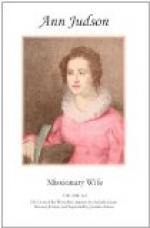he has lost to-day, yet when years have rolled
by, and he shall have felt the unkindness of a deceitful,
selfish world, he will know.
“Mr. Mason wept, and the sorrowing Karens knelt down in prayer to God—that God, of whom their expiring teacher had taught them—that God, into whose presence the emancipated spirit was just entering—that God, with whom they hope and expect to be happy forever. My own feelings I will not attempt to describe. You may have some faint idea of them, when you recollect what he was to me, how tenderly I loved him, and, at the same time, bear in mind the precious promises to the afflicted.
“We came in silence down the river, and landed about three miles from our house. The Karens placed his precious remains on his little bed, and with feelings which you can better imagine than I describe, we proceeded homewards. The mournful intelligence had reached town before us, and we were soon met by Moung Ing, the Burman preacher. At the sight of us he burst into a flood of tears. Next, we met the two native Christian sisters, who lived with us. But the moment of most bitter anguish was yet to come on our arrival at the house. They took him into the sleeping-room, and when I uncovered his face, for a few moments, nothing was heard but reiterated sobs. He had not altered—the same sweet smile, with which he was wont to welcome me, sat on his countenance. His eyes had opened in bringing him, and all present seemed expecting to hear his voice; when the thought, that it was silent forever, rushed upon us, and filled us with anguish sudden and unutterable. There were the Burman Christians, who had listened so long, with edification and delight, to his preaching—there were the Karens, who looked to him as their guide, their earthly all—there were the scholars whom he had taught the way to heaven, and the Christian sisters, whose privilege it had been to wash, as it were, his feet.
“Early next morning, his funeral was attended, and all the Europeans in the place, with many natives, were present. It may be some consolation to you to know that everything was performed in as decent a manner, as if he had been buried in our own dear native land. By his own request, he was interred on the south side of our darling first-born. It is a pleasant circumstance to me, that they sleep side by side. But it is infinitely more consoling to think, that their glorified spirits have met in that blissful world, where sin and death never enter, and sorrow is unknown.
“Praying that
we may be abundantly prepared to enter into our
glorious rest, I remain,
my dear parents, your deeply afflicted,
but most affectionate
child,
“Sarah H. Boardman.”
* * * * *




